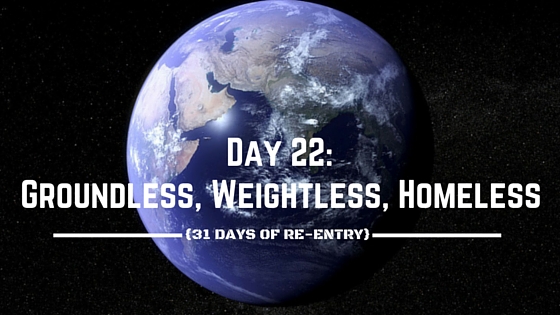As we’ve established, any number of metaphors can aptly illustrate your re-entry experience: trapped underwater, on a boat in raging waters, emerging from another world like Dorothy in Oz or Alice through the Looking Glass or the story behind the word re-entry itself– the feeling that you are re-entering Earth from outer space. No matter the metaphor, whether you feel a tremor or have your whole world collapse (just to add another metaphor to the mix), I hope that these tips will be useful in getting you stabilized.
1. Leave Well
Leaving begins months before you actually leave. Be sure to leave ample time to sort through and give away anything you won’t be bringing back with you (which, if you have truly strived to make your foreign house your home, you may have a ton). Sort, give away and sell your possessions well before you need to do your final packing and goodbyes.
Make a bucket list of places you want to visit in the last six months of your stay. Another really insightful blog series called Falling Forward: Thoughts and Tips on Transition, mentions this as well as intentionally meeting with friends to tell them how much they have meant to you. If you’re like me and have a hard time doing this, I find writing letters or notes to friends meets the same need. But however much you would like to skip this step, grieving will actually be more difficult if you don’t try and reach some form of closure before you leave.
2. Prepare
Come back to this blog series! But seriously, read articles, books and talk to friends BEFORE you leave so that you have a better idea of what to expect. If you are reading this now before your departure, then you are already on track. If you can, attend a conference as soon as you return, but be sure to book it well in advance since many of the good ones fill up early. It’s kind of the idea of reading marriage books before you are engaged because once you are engaged you’ll discuss the wedding more than that actual marriage to follow.
You may be in too much of a fog when you return to actually crack open the books or seek out the help you need. Find and read them beforehand (check out my resource page here). You may also want to prepare your loved ones by telling them that you may need a little extra TLC in the coming weeks and months.
3. Express
Cry, journal, talk, pray, email or text friends–do whatever it takes to work out your emotions. I had no problem with the crying, praying or journaling thing, but I had a hard time finding people to talk to who could actually relate to what I was going through. Find someone who understands and if you can’t, the website Velvet Ashes has some connection groups for women to join online for encouragement and accountability.
I can’t speak for men, but being married to one, I would imagine that this tip of surviving re-entry would be the most difficult to tackle. Perhaps find a female friend to listen to you? We’re usually pretty good listeners:-)
4. Be a Tourist in Your Hometown
Though Chicago had interesting sites galore, because I didn’t have the attitude of a tourist, I didn’t look for opportunities to explore and be an adventurer in my hometown. I think having that mentality would have helped with my transition. Even if you live in Dixon, IL, population 16,000 (my husband’s hometown), you could find at least one or two new places to explore. Take on the attitude of an observer and learner just as you did in a foreign country.
5. Do the Next Thing
You may have heard of this poem by an anonymous poet, but quoted by Elisabeth Elliot, titled “Do the Next Thing.” For a while, this is how you are going to need to live. You may need to find a new job, housing, buy a car, acquire new stuff and get reacquainted with friends and family. Just worry about what you need to do today. Then do the next thing. And then the next thing after that. God will show you, lead you and guide you, but, as Amy Carmichael mentioned in Candles in the Dark in her devotion titled “The Next Step,” the lamp unto our feet may only light our footsteps one step at a time (Ps. 119:105).
6. Give People a Chance
Your loved ones, while they may have read all your newsletters and correspondence, will most likely not have a framework for what you have experienced. Imagine talking to someone who has literally gone to the moon. You would be fascinated…until they start boring you with the technicalities of cargo, equipment and heat shields. Give them grace and give them information over a period of time and not all at once.
Along with this, it is easy to assume that people you meet have NO idea what you have experienced, and they may surprise you with their own stories. Just be prepared with a 20 second, five minute and 15 minute answer to the question, “How was your time in X?” Read their body language carefully to see if they are the slightest bit interested before you launch into the long answer (shifting eyes and a quick excuse to get another drink is a sure sign of “get me out of here”). You have lovely stories, just save them for those who love you the most. And be prepared for people to ask you if and when you are going back.
7. Adjust Your Attitude
This is a difficult one because it will actually be difficult to control your attitude at first. You are going to love being back, but then, much like culture shock, you are going to hate. it. And depending on where you lived, you will especially hate the materialism, the fact that you have to choose from 247 bottles of salad dressings and have to decode the newest food and diet fads. I practically had a break down in one of the biggest Whole Foods in America because I just couldn’t choose what to eat in their café section.
But you need to tell yourself the same thing you told yourself when you moved to an entirely new culture:
“This country is not better or worse, just DIFFERENT. It’s just different.” Say it out loud. “Not better or worse, just DIFFERENT.”
8. Have Patience
I mentioned in an earlier post that you will want to know how long this foggy, drowning, lost feeling will last and I hate to tell you that it will last much longer than you think it should. Just as grief begins to spread out into slow, lapping waves, like a boat that has gone by and left its wake, your grief over leaving your old life will return months and even years after you have come back. A big fear I had was that I would forget all that I had experienced, so one positive aspect of this recurring grief is that it forces you to remember.
9. Take Root and Bear Fruit
If you are a Jesus follower, my advice to you is to cling to Him. And as you do, He will enable you to begin to put down some roots in the city where you are living, which will lead to bearing fruit (Is. 37:31). It may take a little while, but eventually you will need to accept that God has led you home and that He has new ways He wants to bless, grow, mature and use you. Though your world may feel like it’s spinning hypnotically around, God is in control and He is the same at home that He was abroad. He is your constant and His Word is a great stabilizer.
10. Find an Outlet
Depending on where you live, you may be able to find other cultures right in your town–even if it’s just an ethnic restaurant, a 7-Eleven or a nail salon. Since coming back, I found a place to tutor Chinese women trying to get their citizenship, volunteered at an ESL class (with my baby, I might add), hosted an international student party, had a Saudi Arabian girl live with us for a year, and taught at a private Christian school in Chinatown (it all sounds a lot more impressive than it is-some of these were only for a short time–just giving you ideas!). If you live anywhere near a university or even a community college, most of these places have international students who would love to befriend a native speaker.
11. Go Back
I had the opportunity to go back to Uganda seven years after I first left, and China, a year after I left. It was so helpful to return to those places to remind me of the realities of living in another country when I had begun to romanticize my previous experience. Going back to China, it was strange to feel so at home at a place, and yet have so much clarity about being back in the states. If you have the chance, returning to the place where you lived is a helpful way to further bring closure to your experience.
12. Reflect on Your Experience
You have changed. You have faced challenges, learned new languages, seen God answer prayers in miraculous ways, been used in spite of your weaknesses and been given what you needed exactly when you needed it.
Or maybe your leaving wasn’t under the best of circumstances and you feel bitter and wounded. You feel angry at God and doubt whether He even led you there to begin with.
Don’t just jump back into the rushing current of your hometown busyness, but take the time to reflect and consider where you have come from and where you are going. Sit quietly. Listen. Get away. Have a silent retreat. If you have kids, then try and spend some time alone as a family for a week or two in a place where you can decompress.
If you can, don’t start a new job immediately, but take the time to sit and interact with your experience. Check out the prayer on this post and insert your own story into the lines.
This is not the end of your story. This is the end of a chapter in the story of your life, but you are ultimately not defined by this isolated experience. You are deeply loved by a God who gave you the gift of living in a place where you didn’t fit in order to change your perspective forever.
And this is not the end of the gifts He wants to give you, beloved child of the King. This is just the beginning.
What tips would you add to this list? Which ones do you think will be most challenging for you?
Follow me on Twitter and Facebook
This post is day 30 of the series “Re-entry: Reflections on Reverse Culture Shock,” a challenge I have taken to write for 31 days. Check out my other posts in the series:
Day 1: Introduction
Day 2: Grieving
Day 3: No One Is Special
Day 4: Wasted Gifts
Day 5: I Never Expected…
Day 6: Identity: Through the Looking Glass
Day 7: Did I mishear God?
Day 8: When You Feel Like Shutting Down
Day 9: Caring for your Dorothy
Day 10: You’re Not the Only One Who’s Changed
Day 11: 12 Race Day Lessons for Serving Overseas
Day 12: Confessions of an Experience Junkie
Day 13: Longing for Home
Day 14: Readjusting: Same Tools, Different Work Space
Day 15: Book Review: The Art of Coming Home
Day 16: The Story of My “Call”
Day 17: Is Missions a “Higher Calling”?
Day 18: And Then I Fell in Love
Day 19: Is God Calling You Overseas?
Day 20: Life Is Not Seasonal
Day 21: What I Took and What I Left Behind
Day 22: Groundless, Weightless, Homeless
Day 23: When the Nations Come to You
Day 24: The Call to Displacement
Day 25: Scripture Anchors for Re-Entry
Day 26: In the Place of Your Exile
Day 27: Resources for Re-entry
Day 28: A Time for Everything: A Prayer of Leaving
Day 29: Journal: 8 Months After Re-Entry
Day 30: 12 Survival Tips for Re-Entry
Day 31: A Blessing
(Day 32: Writing is Narcissistic (And Four Other Reasons Not to Write)–a reflection on this Write 31 Days experience)






